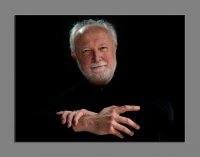John O'Donnell

John O’Donnell is Monash University Organist, Founder/Director of Ensemble Gombert, and Director of Music at All Saints’, East St Kilda. He was born in Sydney and educated at the Sydney Conservatorium of Music, where he was appointed Lecturer in Academic Studies at the age of eighteen. In 1974 he was appointed Senior Lecturer in Music at the Victorian College of the Arts, where he subsequently served a term as Dean. In 1990 he was appointed Senior Lecturer in Musicology at the University of Melbourne. In 1995 he became a freelance performer, combining this with the position of Choir Director at Ormond College from 2007 to 2010.
He performs regularly as conductor, organist, harpsichordist, and pianist and is also active in music research and editing. He has undertaken twenty-one concert tours of Europe and twelve of North America, principally as organist and choral conductor. He is the first person ever to perform Bach’s complete keyboard works (organ and harpsichord) in public, a total of twenty-nine recitals in all. His recordings of the complete keyboard works of Johann Caspar Kerll (which he had previously edited for the Viennese publisher Doblinger) and organ works of Bach have met with international acclaim, an album of the latter named ‘Best Recording of the Year’ (2000) in the London International Record Review. During 2009 he conducted a highly-acclaimed season of Handel’s opera Xerxes with Victorian Opera, for which he was nominated for a Green Room Award, and in 2014 he directed four performances of the oldest extant opera, Peri’s Euridice, newly edited from the original print, at the Woodend Winter Arts Festival.
